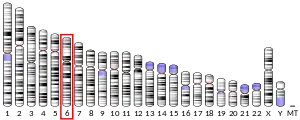| HMGN3 | |||||||||||||||||||||||||||||||||||||||||||||||||||
|---|---|---|---|---|---|---|---|---|---|---|---|---|---|---|---|---|---|---|---|---|---|---|---|---|---|---|---|---|---|---|---|---|---|---|---|---|---|---|---|---|---|---|---|---|---|---|---|---|---|---|---|
| Identifiers | |||||||||||||||||||||||||||||||||||||||||||||||||||
| Aliases | HMGN3, PNAS-25, TRIP7, PNAS-24, high mobility group nucleosomal binding domain 3 | ||||||||||||||||||||||||||||||||||||||||||||||||||
| External IDs | OMIM: 604502 HomoloGene: 130417 GeneCards: HMGN3 | ||||||||||||||||||||||||||||||||||||||||||||||||||
| |||||||||||||||||||||||||||||||||||||||||||||||||||
| |||||||||||||||||||||||||||||||||||||||||||||||||||
| |||||||||||||||||||||||||||||||||||||||||||||||||||
| |||||||||||||||||||||||||||||||||||||||||||||||||||
| Wikidata | |||||||||||||||||||||||||||||||||||||||||||||||||||
| |||||||||||||||||||||||||||||||||||||||||||||||||||
High mobility group nucleosome-binding domain-containing protein 3 is a protein that in humans is encoded by the HMGN3 gene.[3][4][5]
Thyroid hormone receptors are hormone-dependent transcription factors that regulate expression of a variety of specific target genes. The protein encoded by this gene binds thyroid hormone receptor beta, but only in the presence of thyroid hormone. The encoded protein, a member of the HMGN protein family, is thought to reduce the compactness of the chromatin fiber in nucleosomes, thereby enhancing transcription from chromatin templates. Two transcript variants encoding different isoforms have been found for this gene.[5]
References
- 1 2 3 GRCh38: Ensembl release 89: ENSG00000118418 - Ensembl, May 2017
- ↑ "Human PubMed Reference:". National Center for Biotechnology Information, U.S. National Library of Medicine.
- ↑ Lee JW, Choi HS, Gyuris J, Brent R, Moore DD (Jul 1995). "Two classes of proteins dependent on either the presence or absence of thyroid hormone for interaction with the thyroid hormone receptor". Mol Endocrinol. 9 (2): 243–54. doi:10.1210/mend.9.2.7776974. PMID 7776974.
- ↑ West KL, Ito Y, Birger Y, Postnikov Y, Shirakawa H, Bustin M (Jul 2001). "HMGN3a and HMGN3b, two protein isoforms with a tissue-specific expression pattern, expand the cellular repertoire of nucleosome-binding proteins". J Biol Chem. 276 (28): 25959–69. doi:10.1074/jbc.M101692200. PMID 11356838.
- 1 2 "Entrez Gene: HMGN3 high mobility group nucleosomal binding domain 3".
Further reading
- Olsen JV, Blagoev B, Gnad F, et al. (2006). "Global, in vivo, and site-specific phosphorylation dynamics in signaling networks". Cell. 127 (3): 635–48. doi:10.1016/j.cell.2006.09.026. PMID 17081983. S2CID 7827573.
- Gerhard DS, Wagner L, Feingold EA, et al. (2004). "The status, quality, and expansion of the NIH full-length cDNA project: the Mammalian Gene Collection (MGC)". Genome Res. 14 (10B): 2121–7. doi:10.1101/gr.2596504. PMC 528928. PMID 15489334.
- Ota T, Suzuki Y, Nishikawa T, et al. (2004). "Complete sequencing and characterization of 21,243 full-length human cDNAs". Nat. Genet. 36 (1): 40–5. doi:10.1038/ng1285. PMID 14702039.
- Mungall AJ, Palmer SA, Sims SK, et al. (2003). "The DNA sequence and analysis of human chromosome 6". Nature. 425 (6960): 805–11. doi:10.1038/nature02055. PMID 14574404.
- Strausberg RL, Feingold EA, Grouse LH, et al. (2003). "Generation and initial analysis of more than 15,000 full-length human and mouse cDNA sequences". Proc. Natl. Acad. Sci. U.S.A. 99 (26): 16899–903. Bibcode:2002PNAS...9916899M. doi:10.1073/pnas.242603899. PMC 139241. PMID 12477932.
- Leong PW, Liew K, Lim W, Chow VT (2002). "Differential display RT-PCR analysis of enterovirus-71-infected rhabdomyosarcoma cells reveals mRNA expression responses of multiple human genes with known and novel functions". Virology. 295 (1): 147–59. doi:10.1006/viro.2002.1353. PMID 12033773.
External links
This article is issued from Wikipedia. The text is licensed under Creative Commons - Attribution - Sharealike. Additional terms may apply for the media files.


